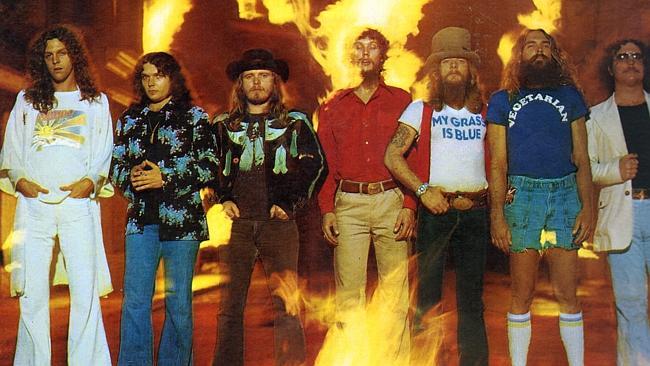That Smell: inspiration sole survivor from other days music died
The plane crash that killed three members of Lynyrd Skynyrd was presaged by a song released only days before.

That Smell. Lynyrd Skynyrd (Written by Ronnie Van Zant and Allen Collins — did not chart)
When Leonard Skinner died in 2010, after suffering from Alzheimer’s for several years, The New York Times, which did not usually publish obituaries on Florida schoolteachers, called him “arguably the most influential high school gym teacher in American popular culture”.
You could safely remove the word “arguably” from that sentence.
Three boys — Ronnie Van Zant, Allen Collins and Gary Rossington — who attended the Robert E. Lee High School in Jacksonville, where Skinner strictly applied its rule against long hair, named their rock band in mocking honour of him: Leonard Skinnerd they were for a time.
As Lynyrd Skynyrd, the band briefly would be at the frontline of southern rock and were on the verge of international success when three members were killed in a plane crash in 1977.
That crash, the album — Street Survivors — they had released three days earlier, and the manner in which the fates have pursued band members since, rates as one of the most extraordinary stories in popular music.
By the early 1970s, Lynyrd Skynyrd, along with the Allman Brothers, Charlie Daniels and the Marshall Tucker Band, was reclaiming the south’s ownership of rock ’n’ roll. The genre had been born there. Its biggest stars — Elvis Presley and Buddy Holly among them — were from there. But rock music had become a business and it was based in Los Angeles.
Lynyrd Skynyrd had scored two big Billboard albums and two top-selling singles: Free Bird and Sweet Home Alabama. The latter reached No 8 in 1974 and was a response of sorts to Neil Young’s Southern Man and Alabama, sloppily written criticisms of the south their author almost immediately regretted. Young admired the band and wrote the song Powderfinger — acclaimed by Rolling Stone magazine last year as his most powerful — for it, but Lynyrd Skynyrd did not get around to recording it before the events of 1977.
Aristotle held that art imitates life. Oscar Wilde’s cheeky riposte in 1889 was that “life imitates art far more than art imitates life”. Wilde has been proved right, Lynyrd Skynyrd doing so emphatically.
By the time the band recorded Street Survivors, it had recruited Steve Gaines, a brilliant lead guitarist whose sister Cassie was a back-up singer for Lynyrd Skynyrd. Van Zant was mesmerised by the recruit’s skill: “We’ll all be in his shadow one day.”
Gaines could sing as well and, along with his songwriting, changed the course of his new band, giving it an imposing and aggressive three-pronged guitar attack. The legendary Tom Dowd was brought in to produce the album, an investment that suggested record label MCA thought the band was about to break into the first division.
One of the songs was That Smell, written by Van Zant and guitarist Collins, referring to a car accident Rossington had survived the previous year. Rossington’s injuries had stalled a tour and the band had fined him.
Whiskey bottles, and brand new cars
Oak tree you’re in my way
There’s too much coke and too much smoke
Look what’s going on inside you
Ooooh that smell
Can’t you smell that smell
Ooooh that smell
The smell of death surrounds you.
Van Zant was annoyed with, and worried for, Rossington, whose alcohol and drug intake bothered his colleagues.
The cover of Street Survivors shows the band standing engulfed in flames. It was released on October 17, 1977. Three days later the band’s leased Convair CV-240 ran out of fuel and crashed in swampland near Baton Rouge, Louisiana. There were 26 people aboard the 1947 aircraft: the crew was killed along with Van Zant, Steve and Cassie Gaines and a tour manager. The survivors suffered serious, life-changing injuries.
It was almost dark. Drummer Artimus Pyle had bones poking through his skin. But he had trained with the marines and was fit. With others he sought help and approached a remote farmhouse where Johnny Mote was bundling some hay. To say Mote’s response was very American might be to underplay the moment. “I looked to my left, and three guys came running towards me out of the woods … the first thing I thought of was Charles Manson.” Mote shot Pyle in the shoulder. One may ask: who bundles hay with a rifle?
A few years earlier, Pyle’s father, a pilot, as is Pyle, had been killed in a mid-air plane crash. Pyle has since survived two more plane crashes. But among the members of Lynyrd Skynyrd — he no longer plays in the band — he truly is the lucky one.
“That smell” has hung around the band since that song was recorded in 1977. In the plane crashCollins, its co-author, suffered a broken neck and had injuries to his arm so severe doctors talked of amputating it. In 1980 he joined forces with Rossington to form the Rossington Collins Band, but days into their first tour his wife died of a cerebral haemorrhage and it was abandoned.
In 1986 he drunkenly crashed his car, killing a girlfriend. He spent the rest of his life in a wheelchair and died, aged 37, of pneumonia.
Steve and Cassie Gaines’ mother, Cassie LaRue, was killed in a car accident 18 months after her children. She was driving near the cemetery where her famous son and daughter were buried. She lies there, too.
Bassist Leon Wilkeson died suddenly in a Florida hotel room aged 49 in 2001.
Keyboardist Billy Powell missed an appointment with his doctor the day of his death, also in Florida, aged 56, in 2009.
Rossington, whose risk-taking lifestyle inspired Lynyrd Skynyrd’s famous song, plays in the band to this day, its sole original member.



